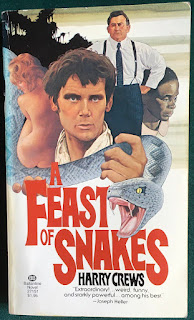But not only is he always misunderstanding everything to an extreme, he is also kind of an asshole. He is super prude about sex in a way that nobody else around him seems to be. Two different women want to have regular sex with him with no strings attached but niceness and not only does he have to reject them, he has to do it in the most assholish way guaranteed to piss them off (and unfairly). And then to make matters worse, he is also a homophobe! His best friend, who may not even be a human and can switch identities and genders and peels his skin like a snake every year, is in love with him. When he pushes the friend to admit this, he then shuns him and is all angry. Like WTF?! Yes, this can be awkward, but anger? Just maddening. He spends the entire book shunning his biological daughter because he is so convinced that if he shows himself to be alive, her adopted dad will be destroyed? The same person who is devastated and blames himself for his death? Make it make sense.
And the final thing that is really bugging me is that he acts like he has to make this tough choice whether or not to support Prince Dutiful in his quest to kill the dragon. He frames it like this terrible choice between supporting the Fool and saving the dragon so they can mate and dragons can come back which duh everybody wants and would be good for the world or killing the dragon because his prince took up a challenge from his bride which she was obviously forced by the evil white prophet to make. Obviously, you save the dragon and try to free the Outislanders from the white prophet's coercion.
The thing is despite these frustrations, Hobb always manages to pull it back by the end. There is some redemption and positive developments in FitzChivalry's whiney life and more importantly, the storylines are gripping and conclude in exciting and satisfying ways. The brutal fight scene where the Piebald leader and his supporters get their just desert is intense, brutal and extremely satisfying (though still we have to have Fitz get all resentful because he got left in jail afterwards and feeling abandoned when it obviously was the right thing to do and he was better protected because of it). The negotiations with the mixed representatives of the Old Blood is equally satisfying and almost promising, with the bonus that the young prince shows some character as well.
I am surging on to the last book in the trilogy and then can move back to the Rain Wilds where there are also some annoying characters, but a nice mix and done I hope in third person so I don't have to hear their thoughts.




















